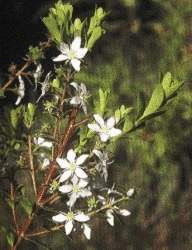

Buchu (Barosma betulina, B. crenulata, B. serratifolia)
Folk Names: Agathosma betulina, Bookoo, Bucco, Buccoo, Bucku, Bucoo, Buku, Diosma betulina, Ibuchu, Short Buchu; B. crenulata – Oval Buchu, Shortbroads; B. serratifolia – Long Buchu
Description: Buchu is a small shrub two to five feet high. It is found principally in South Africa. The pale-green leaves are obovate or ovate with blunt, strongly curved tips and serrate margins. They are opposite, glossy, and leathery. Round oil glands are scattered through the leaves. Each flower has five petals and is whitish to pink. The fruit is an ovate capsule. The leaves smell somewhat like rue or peppermint, and have a strongly aromatic taste.
Effects: gentle
Planet: Moon
Element: water
Associated Deities:
Traditions:
The leaves are gathered while the plant is in flower or fruiting and dried.
Magic:
An infusion of Buchu is drunk to increase prophetic ability. It is also a diuretic however, so be prepared for that potty break afterwards.
It was used among many tribes, especially the San and Khoi tribes of Southern Africa, as an ointment to ward-off evil spirits, but if nothing else, it wards off insects which can be evil all on their own.
Known Combinations:
Buchu may also be burnt with Frankincense before sleep for prophetic dreams.
Medical Indications: Parts used: leaves
In the seventeenth century, Dutch colonists of South Africa learned about the herb from the natives and adopted buchu for urinary tract infections, kidney stones, arthritis, cholera, and muscle aches. The leaves of this shrub contain barosma camphor, diasmin, essential oils, l-enthone, hesperidin, mucilage, resin. The oils found in buchu increases urine production. The Hottentots have used buchu to brew a strong tea of dried leaves for urinary disorders, painful urination and inflammation, gravel, catarrh of bladder, and leucorrhea for many years. In South Africa an infusion is made with brandy for a stomachic and stimulant tonic. Buchu is also known to decrease inflammation of the colon, gums, mucus membranes, prostrate, sinuses, and vagina. Some studies have even indicated that it may be helpful for diabetes, and digestive and prostrate disorders. When added to the bath, it may be used to relieve body aches.
Nutrition:
none known
Mercantile Uses:
Authorities of Cape Town have restricted the harvesting of buchu in an effort to protect the wild plants. No one is permitted to pick or buy it without a license.